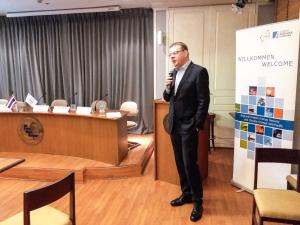Carbon Markets and the Electricity Sector - Regional Programme Energy Security and Climate Change in Asia and the Pacific
The first day of the workshop, which took place in the Foreign Correspondents Club of Thailand (FCCT), was introduced by presenting the framework of potential strategies to reform the electricity market and the regional carbon market cooperation in East Asia. Several key opportunities and mega trends like liberalization and decentralization of the carbon market were highlighted and “Deep Decarbonization” was identified as the main challenge in the 21st century. The following discussion arose the subjects of the importance of the carbon market in the reduction of the Greenhouse gas emission (GHG) and the need for new policies in the carbon markets in Asia, while keeping an eye on the affordability of green energy for the population.
The core of the first session was carbon pricing and electricity sector regulations through emission trading systems (ETS). ETS works most effective in liberalized markets and function as price signals, which creates incentives for the different indicators such as consumption, investment, etc. ETS can work under different forms of regulations but have to be carefully designed and embedded into credible long term frameworks since the implementation is politically challenging. For ongoing background information the “ICAP Status Report 2019: Emission Trading Worldwide” was provided as insightful source.
Afterwards, the participants were divided into three small groups that dealt with ETS investment in electricity sector, economic dispatch and potential electricity exchange at regional level in the market place and discussed how an ETS can be designed in a way that price signal is felt in electricity sectors with different regulation structures.
The second session focused on ETS and its policies in different countries and jurisdictions. It was highlighted how the EU ETS interacts towards energy transition and which challenges and opportunities and introduction of different ETS into the carbon and electricity markets in Vietnam, the Philippines and China provides. Furthermore an introduction to the German decarbonisation process was offered as well as the target of drastic emission reduction by 2030. The day of the workshop was finalized with presentations by students from the CUHK (Hong Kong) and the Chulalongkorn University (Thailand), who were given the opportunity to present their research projects to the participants of the workshop. The students covered the subjects of Thailand’s electricity system, the regulations in the electricity market and Thailand’s obligations and commitments to emission reduction through implementation of an ETS. Students of the CUHK talked about legal framework of the energy markets in China, third party access in electricity network in Chinese law and solving Chinas curtailment problem by setting up markets for renewables.
Lastly, the participants spoke about carbon pricing and energy market integration and challenges and opportunities for carbon financing (“Green financing”) in East Asia. The possibility of market linkage cooperation in East Asia was presented and how cooperation between states can be controlled and coordinated. Furthermore the key impediments of East Asian carbon markets were discussed and how the harmonization of energy markets through cooperation can function as long term strategy. The workshop was concluded by a final discussion about developing future projects in enhancing the energy and carbon market structure in East Asia and implementing ETS through regional integration.









